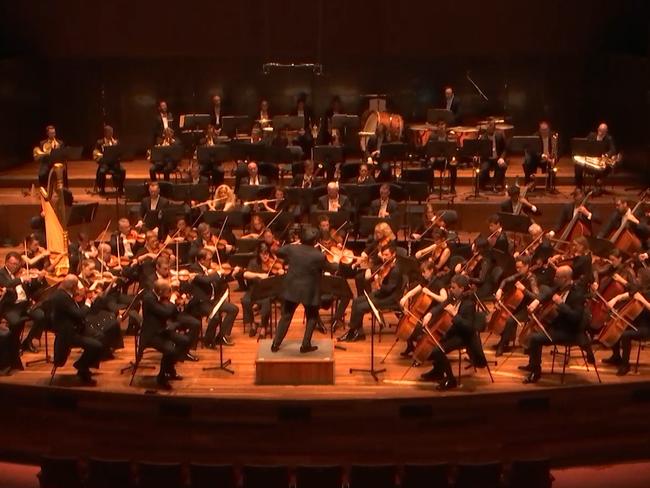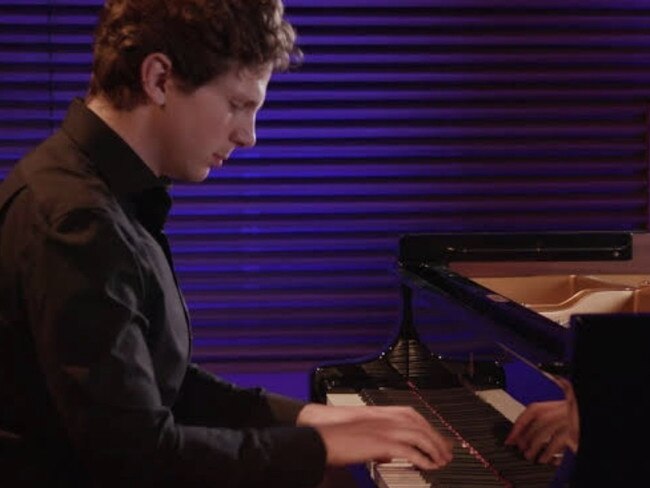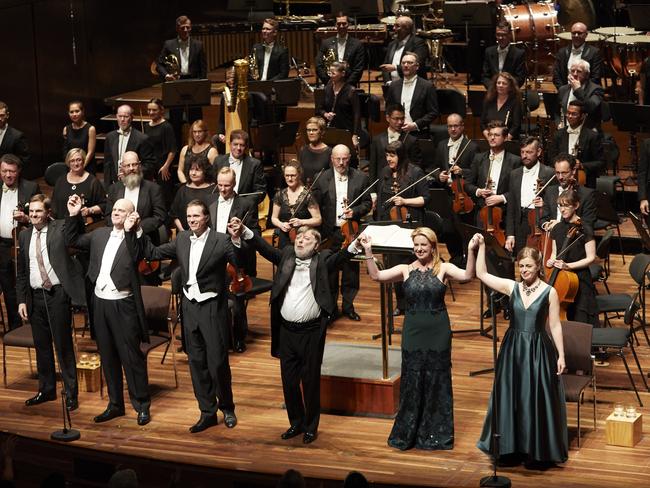MSO in disharmony: Vote to boot leaders for cancelling pianist leads to external review
The MSO will conduct an independent, external review of its policies and procedures after musicians passed a vote of no confidence in management when it cancelled a renowned pianist.

Victoria
Don't miss out on the headlines from Victoria. Followed categories will be added to My News.
The Melbourne Symphony Orchestra will conduct an independent, external review of its policies and procedures after its musicians sensationally passed a vote of no confidence in senior management.
The shock move came after the MSO axed acclaimed pianist Jayson Gillham from a performance, ostensibly because he had previously dedicated a song to the situation in Gaza.
The musicians also claimed there was a poor work culture at the world famous MSO.
The drama prompted Melbourne band The Cat Empire to announce it was postponing three shows with the MSO scheduled for August 22 to Aug 24.
No date has yet been given on when the concerts will go ahead.
On Instagram the band posted: “We value the principles of freedom of speech, artistic expression, and inclusivity.
“Therefore, in good conscience, we’ve made the decision to postpone next week’s shows at Hamer Hall.”
On Friday, a MSO spokeswoman told the Herald Sun a thorough review would take place, that included an investigation of the events leading up to the decision to cancel Mr Gillham’s concert.
The musicians had earlier condemned the actions of MSO managing director Sophie Galaise and chief operating officer Guy Ross for what they claimed was “dismissive” responses to mediation attempts.
In a letter to the MSO board, they said the orchestra’s reputation had been “called into disrepute”, and the removal of Mr Gillham from the program highlighted “years of unresolved concerns” within the company.

The MSO work environment was “characterised by poor communication, a lack of accountability and continuing declining morale”, the musicians said in a letter, obtained exclusively by the Herald Sun.
“More seriously, numerous decisions made without consultation with staff and musicians have resulted in significant negative artistic and financial impacts on the MSO, as well as on our perception as an arts leader in Victoria and Australia,” they said.
“The gravity of the current situation faced by the organisation this week concerning the cancellation of Jayson Gillham as soloist has only served to highlight these issues, and demonstrate this continued pattern of behaviour.”
At a concert on Sunday, Jayson Gillham dedicated a solo to journalists under threat and killed in Gaza. His next concert, scheduled for Thursday, was then cancelled.
“We no longer have faith in the abilities of our senior management to make decisions that are in the best interests of the company at large,” the musicians’ letter said.
“The members of the orchestra in no way take this decision lightly, but believe that this decision is vital for the ongoing viability of the company given the degree to which the MSO’s reputation has been called into disrepute.”

The MSO spokesperson said the board had decided to conduct a formal review to “provide transparency and certainty” for its musicians, MSO supporters and the wider community.
“Noting the letter to the board from MSO musicians, the board will provide more
information on the review, including the terms of reference, as the details are finalised,” she said.
“The Melbourne Symphony Orchestra is determined to ensure we have the protocols
in place that are fit for purpose for our organisation and the role we play within the
community.”
The musicians’ letter had stated they no longer had faith in the abilities of MSO senior management to make decisions that were in the best interests of the company.
“The members of the orchestra in no way take this decision lightly, but believe that this
decision is vital for the ongoing viability of the company given the degree to which the
MSO’s reputation has been called into disrepute,” it said.
The musicians said the work environment at the organisation had been characterised by “poor communication, a lack of accountability and … declining morale”.
The letter also stated that while the no-confidence vote had been triggered by the treatment of Mr Gillham this week, it was in fact the culmination of years of angst among the musicians towards management, and a “constant decline of workplace culture”.
“Despite ongoing attempts to engage with senior leadership and provide feedback through formal channels — including committee consultations, employee culture surveys and internal
grievance procedures — the response from management has been insufficient, and in many cases dismissive.”
In a short speech before his piano solo, Mr Gillham — whose social media clearly shows he is pro-Palestinian sympathiser and actively supports effort to raise funds for the Palestine Children’s Relief Fund — spoke on Gaza and said the role of a journalist was to “document” and “witness”.
“The killing of journalists is a war crime in international law, and it is done in an effort to prevent the documentation and broadcasting of war crimes to the world,” he said.
“In addition to the role of journalists who bear witness, the word witness in Arabic is shaheed, which also means martyr.”
Paul Davies, campaign manager for the musicians’ union, the Media, Entertainment & Arts Alliance (MEAA), told the Herald Sun on Friday the vote was “pretty much unanimous”.
But he said the musicians were shattered their letter had been leaked and was now in the public domain because they were confident the situation could be resolved.
He said the primary concern of the musicians was not cause damage to the MSO, or its reputation.
“The musicians of the MSO are extremely disappointed that the letter expressing their concerns and the resolution of a full orchestra meeting on Thursday night has been made public,” he said.
“The intention of the musicians, through their union, was to send the letter to the board so that it could take it into consideration and take any necessary action without any further public scrutiny or pressure.”

Mr Davies said a deliberate decision had been made not to release the letter publicly in order to allow that to happen.
“The will of the musicians at the MSO is overwhelmingly to protect the organisation, to protect the orchestra, despite the difficulties of the last week and the bad decisions that have been made,” he said.
“The musicians decided, through their union, to take this action (but) they don’t want to further damage the reputation of the orchestra. They trust that the board will take the message that’s been sent to them seriously.”

However, in a public statement on Thursday the MEAA said the MSO had “overstepped the mark by declaring that a concert stage is not an appropriate forum for political comment”.
“Political commentary through artistic expression is a longstanding tradition of hundreds of years, and many of the great works of music, opera and other art forms have been inspired by and refer to the political issues and current affairs of the day. It has also been a part of programming by the MSO on numerous occasions,” it said.
And MEAA federal president Michael Balk said the ban on political commentary was dismissive of MSO musicians and staff.
“MSO management’s initial decision to cancel Jayson from performing with the full orchestra on Thursday was inappropriate, particularly after Jayson’s contextualised introduction of the work,” Mr Balk said.
“The explanation from MSO’s management on disallowing political comments on its stages is an overreach. Our artists have voices and this decision amounts to censorship, fuelling anger already felt by musicians.”


